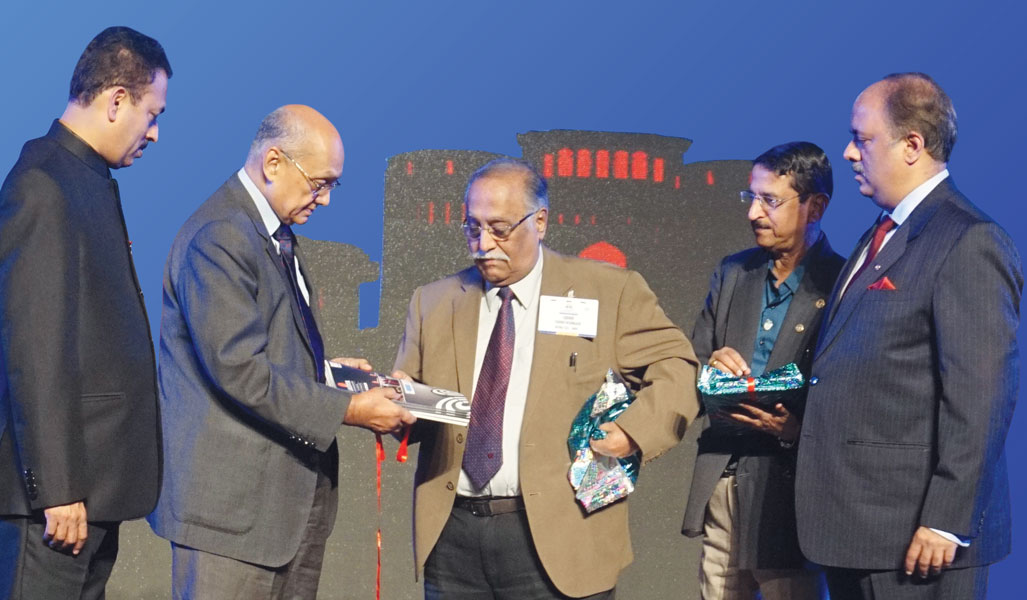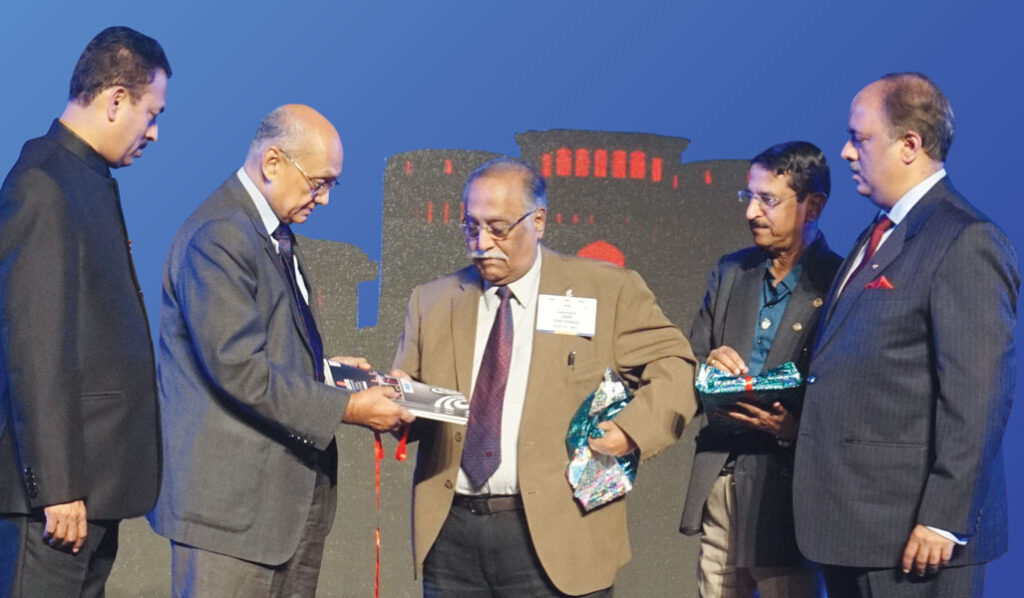Ramon Magsasay Award winner and founder of M V Foundation, an NGO that has put one million children in school, Shantha Sinha, stole the hearts and minds of the 1,250-odd delegates at the South Asia Literacy Summit in Pune when she told the gathering that her organisation has already put one million children in school.

“I had decided to retire saying enough is enough. But in the last one hour I feel so much energy. I came empty-handed but picked up so much energy, and I’ve decided to send back 20,000 more children to schools. You’ve given me that courage.”
Putting children into schools is not a “soft” or easy programme; it is ridden with conflicts and has hidden agenda.
She had the audience cheering her when she said that to make India — and the rest of South Asia — totally literate by 2017 or 2018 was a “crazy dream … such things require a quirk, a passion … but we have to trust people … the youth of this country and their capacity.”
Shantha admitted that if there has to be a difference in the country and a great leap forward, it could happen only with education and literacy. But, she warned the assembled Rotarians listening to her in rapt attention, sending children back to schools was neither an “easy nor a soft programme. It is ridden with conflicts and hidden agendas.” To put one million children back into schools, they had to virtually resolve a million conflicts — stop 20,000 child marriages, pull 15,000 children out of bonded labour and rescue thousands of trafficked children, without the associated stigma.

But the trick to succeed in such an endeavour, where “hidden power structures operate in keeping children out of schools, is to believe that there cannot be any enemies in this programme.” Shantha said that the mistake several people working in children’s education make is to adopt an “adversarial position against the employers, school teachers, parents, government … and think all of them are no good. But our programme starts with the assumption that everyone is an ally, a partner.”
We are all mad; mad about children and their education. That is why we are here … without madness, such a movement will be lost like a bubble.
She gave an example of a young woman who was running an evening motivation centre. The man who employed those children came to attack her with an axe because she was trying to take away his bonded labour. The children protected her. But the next day, when she found him on the same bus as hers, she asked him: “What did I do so wrong that you wanted to kill me?” But later, she felt she had erred in challenging him thus in a public place, so went and apologised to him and said if he released the children from bondage, she would honour him. He did that and she honoured him at a public function where he did a vidya daan ceremony, presenting books, schoolbags, etc to the children, saying: “Go ahead and study well!”

Rotary and alliances
Such conflicts had to be resolved, and alliances made. This was exactly what Rotary had been doing all the time, expanding its base and building alliances. “This is just like your polio drive where you would have planned every polio drop for every child … otherwise you couldn’t have won the polio battle. This too is as important as every polio drop … that you touch every child to get the child back into school.”
Promising her support in the resolve to make India totally literate, Shantha said building such a social movement or mood requires “a madness … we are all mad; mad about children and their education. That is why we are here … without madness, such a movement will be lost like a bubble.”
G D Birla donated wholeheartedly to education because he believed in its power.
Deepening democracy
But in this journey Rotarians would have to strengthen village panchayats, school management committees and teachers. The Literacy Summit was commendable because here the attempt was to give the child her dignity. “When she is educated, you will also be breaking the cycle of poverty, bringing both gender and social equity by bridging the inequalities of society, thus deepening democracy, which is much more than just the voting right.”

Denial of education was like being apartheid, and once this difference between the haves and have-nots was removed, India would become a great nation, she added.
Skilling India
Addressing the summit, Minister of State for Skill Development, Rajiv Pratap Rudy, said an urgent need of India today was imparting adequate skills to its young, untrained population. And for this, the first major step would be training a massive number of trainers to carry out this skilling gap, and then certifying them so they could both train and certify those they trained.
Against 74 per cent in German and 80 per cent in Japan, India has a skilled workforce of only two per cent.
Reeling off statistics, he said that while Germany has a 74 per cent skilled population, the United Kingdom has 68 per cent and Australia 60 per cent. Japan is far ahead with 80 per cent and South Korea has a staggeringly high 96 per cent skilled manpower. “India, on the other hand, has only 2 per cent of its population that can be termed as skilled work force.”
Quoting a UN report, he said that in the years ahead, India will have the world’s largest chunk of young population in the age group 15–35 years. This massive group will have to be given the right skills and that was a huge challenge.

Towards meeting this requirement, the GoI had decided to partner with the Indian armed forces to utilise the skills of those defence personnel who retire at an early age, to create the required group of trainers in various skill development programmes. They had the skills, the commitment and discipline to carry out this task, Rudy added.
Birlas’ contribution to education
Recalling the Birlas’ 20-year association with Rotary, Rajashree Birla, Chairperson, Aditya Birla Centre for Community Initiatives and Rural Development, said the family’s engagement with education began 100 years ago, with G D Birla, influenced by Pandit Madan Mohan Malaviya, supporting educational charities in Kolkata and in Mumbai, in partnership with Jamnalal Bajaj.
In 1918, the Birla family established a high school in Pilani. “The evolution over the last 50 years, from a tiny pathshala to the marvel that is BITS Pilani, an Institute, offering the best of science and technology education, makes for a splendid story.” BITS has now spread to Goa, Hyderabad and Dubai.
Education was very much ingrained in the “Birla family’s DNA,” Rajashree said, adding that G D Birla donated “wholeheartedly to education because he believed in its power.” The Aditya Birla Centre reaches out to thousands of children, and makes an aggressive push for both girls’ education and holistic education, all the time instilling in children a solid foundation of values such as love, compassion, empathy and integrity.
PRID Ashok Mahajan rued that we had already lost a lot of time in not giving due importance to education, resulting in, as a 2014 UN report pointed out, India having the “highest population of illiterate adults at 287 million — 37 per cent of the global adult illiterate population.”
While enrolment rates are rising steadily, the UN estimates that poor girls/women will be able to get the benefit of literacy programmes only by 2080. Blaming poor infrastructure in schools, lack of qualified teachers especially in rural areas, inaccessibility, lack of toilets and transport facilities for the high dropout rates at secondary and higher education levels, he said while these should be checked, the adult illiterate should be engaged and interested in becoming literate through innovative methods, shedding our “machine-like approach to education.”
Pictures by Rasheeda Bhagat
Pakistani Rotarians gear up for literacy

Mei aisi kaum se hu jiske woh bacchon se darta hei.
Bada dushman bana phirta hei jo bachhon se ladta hei.
(I belong to a community whose children terrify him / What kind of enemy is he that he has waged a war on children?)
As the Pakistan National Literacy Chair Faiz Kidwai projected this video clip on the mammoth screen at the South Asia Literacy Summit, there was a hushed silence in the hall. Sung by a 10-year-old Pakistani child, it summed up the trauma of the children of a nation targeted by the Taliban. The song was dedicated to the children of the Army Public School who were so brutally murdered on Dec 16, 2014 in Peshawar.
“This will be one of the black days of this world. Since then I myself have been having nightmares; the children who were murdered, come into my dreams and ask what was our fault? There is no answer for that question,” said Kidwai.
Kidwai said Rotarians in Pakistan faced many challenges today, including a huge one to make their country polio-free. “All those involved in social development work of any kind in Pakistan are facing risks — terrorism, economic and social instability; 1,000 schools have been destroyed and 6 lakh children affected. But yet all those committed to bettering the lives of our people continue their work.”
Along with Pakistan National PolioPlus Chair, Aziz Memon, he believed that a big push for literacy in Pakistan would help in polio eradication. A lot of people in Pakistan had pinned their hopes on Malala Yousufzai, who this year won the Nobel Peace Prize with Kailash Satyarthi of India. She survived an attack on her life and “I believe Malala is going to lead the children of this world for a better world. I also feel this is the last chance for our generation. If we fail, the next generation is going to tell us to sit back and they will lead their own journey. So it is better that we do something before they push us back.”
Expressing gratitude to RILM Chair Shekhar Mehta and his team for training Pakistani Rotarians on the practices being followed in India in the drive for literacy, Kidwai disclosed plans to build schools in Pakistan, train supplementary teachers, equip teaching centres etc. By year-end they planned to build 1,000 e-learning centres and train 2,000 teachers. They were also focused on inculcating the reading habit in children. The target was to collect a million books to establish libraries; in two months 3,00,000 had already been collected.
Rotarians in Karachi had signed an MoU with the education directorate to adopt 88 schools, “where we’ll improve the quality of education through our teacher training programme.” The added benefit: Rotary can also use these campuses for adult literacy, vocational training, etc. Rotary had also signed an MoU with USAIDS which was building 120 schools in Pakistan; “normally they build schools and hand them over to the government, but instead of doing that they want Rotary to manage these schools. We’ll adopt some of these and take care of their computer and science labs too,” Kidwai added.
He concluded with an excerpt from Malala’s Nobel acceptance speech: “Let us become the first generation to decide to be the last. The empty classrooms, the lost childhoods, wasted potential — let these things end with us. Let this be the last time that a boy or a girl spends their childhood in a factory … a girl gets forced into early child marriage; an innocent child loses his life in war; a classroom that remains empty; a girl is told education is a crime and not a right; a child remains out of school. Let us begin this ending. Let this end with us.”
(Watch the song sung by the Pakistani child on this link: https://www.youtube.com/watch?v=P4X5ds_Qq2M)






